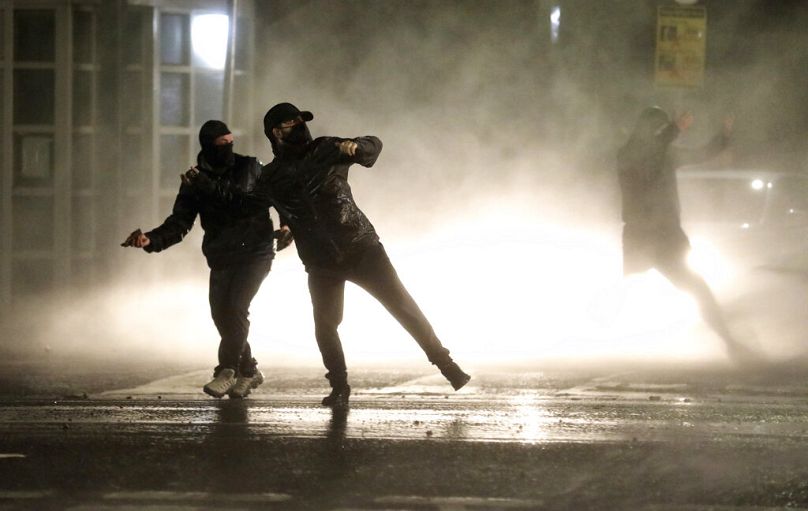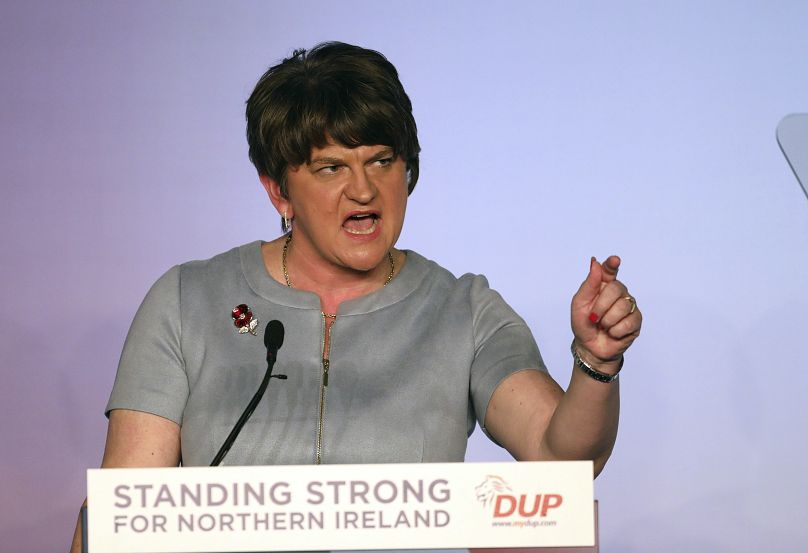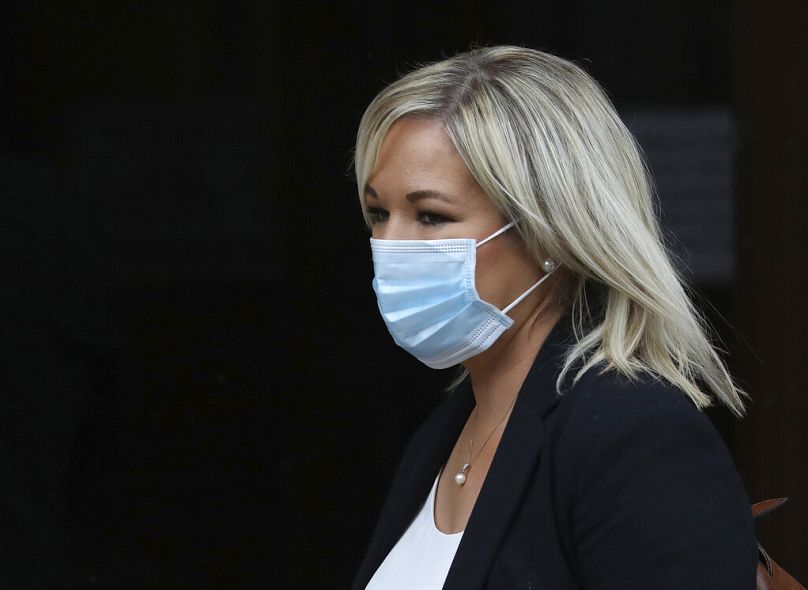Successive nights of violence in various majority unionist areas of Northern Ireland has left dozens of police officers injured - but what has started the unrest?
Dozens of police officers have been injured in successive nights of violence across parts of Northern Ireland - unrest that has drawn comparisons to the early days of the Troubles.
On Thursday night, police deployed a water cannon to disperse rioters close to an interface in west Belfast that separates unionist and nationalist areas, parts of the city home to Protestant unionists who identify as British in the United Kingdom, and areas home to Catholic nationalists who want a united Ireland.
This followed on from worse disturbances on Wednesday when a gate separating the areas in Belfast was broken through, and a bus was set alight. Meanwhile, other riots in mostly unionist communities in Carrickfergus, Londonderry and Newtownabbey have seen protesters burning vehicles and throwing petrol bombs and bricks.
"Last night was at a scale we haven't seen in Belfast or further afield in Northern Ireland for a number of years," PSNI Assistant Chief Constable Jonathan Roberts said of Wednesday's violence.
What started the riots?
The spark came at the end of March when the PSNI - the Police Service of Northern Ireland - decided not to prosecute senior members of Irish republican political party Sinn Fein for attending a large funeral procession for former IRA intelligence boss Bobby Storey.
At the time of the funeral in June last year, there were strict limits in place for gatherings, as well rules for social distancing due to the pandemic.
Deputy First Minister Michelle O'Neill was among the attendees and was widely criticised, revealing further fragmented relations in Stormont. It resulted in First Minister Arlene Foster, the leader of the Democratic Unionist Party (DUP), refusing to carry on with joint coronavirus press conferences.
This was kept up until September when O'Neill admitted her actions had "undermined" the pandemic strategy.
Is this the only reason for the riots?
No, it's not. Relations have been growing tenser for some time, having been brought firmly to the fore when the UK voted to leave the European Union (the majority of Northern Ireland voted to remain).
The biggest issue, however, was the prospect of a border being erected between Northern Ireland and the Republic of Ireland. Such a move would breach stipulations in the Good Friday Agreement, the treaty that mostly brought three decades of Protestant-Catholic bloodshed to an end.
This is where the Northern Ireland Protocol becomes relevant: it is a large part of the reason for the rioting today.
As part of EU-UK negotiations on Brexit, it was agreed Northern Ireland would partially remain in the bloc's single market, meaning goods sent over to Northern Ireland from Britain would receive EU customs checks at NI ports - cancelling out the need for checks between NI and Ireland.
The issue, however, is that customs checks at NI ports effectively draws a sea border between Great Britain and Northern Ireland. Loyalists argue this undermines NI's role in the union.
Where are the riots happening?
Various cities around Northern Ireland have witnessed unrest in mostly unionist communities since March 29.
In Belfast, standoffs have occurred between the unionist Shankill Road and the nationalist Springfield Road, while more than a dozen PSNI officers were injured in disturbances in the Protestant area of Sandy Row.
Other locations to experience unrest are Carrickfergus, Londonderry and Newtownabbey. Protests have also been ongoing in Portadown, Ballymena and Markethill.
Who is involved in the violence?
According to police and community leaders, the crowds mostly consist of youths - some as young as 12 or 13. And while multiple reports have suggested paramilitary involvement, an umbrella organisation representing several unionist groups has denied involvement.
"The Loyalist Communities Council (LCC) can confirm that none of their associated groups have been involved either directly or indirectly in the violence witnessed in recent days," the LCC said on Friday.
"The right to peaceful protest is a fundamental human right but we have made it clear in all our public statements that any actions taken by the Loyalist community should be entirely peaceful. We again place on record our absolute determination to remove the hard border between Northern Ireland and the rest of our country that has been imposed on us by the NI Protocol [...]
"The LCC is seeking an end to all violence and to solve the underlying concerns of the Loyalist and Unionist communities whether that is due to the imposition of the Protocol, or the clear feelings of inequality in how our communities are policed and how justice is administered.
"We are determined to ensure that these serious and legitimate political concerns felt across Unionism and Loyalism are not allowed to be framed in terms of criminality."
What's the official reaction?
Leaders of the UK and Ireland have called for a stop to the violence, while attention has also been captured in the White House.
"We join the British, Irish and Northern Irish leaders in their calls for calm," said White House press secretary Jen Psaki on Thursday as she expressed concern on behalf of Joe Biden's administration.
Meanwhile, Arlene Foster has said the violence is "an embarrassment" to the country and demonstrates "when politics are perceived to fail, those who fill the vacuum cause despair". She said she believed the rioting also took the focus off "the real lawbreakers in Sinn Fein".
Michelle O'Neill said the violence was "utterly deplorable", adding: "These inflammatory protests must be urgently called off before someone is seriously hurt or worse. The criminal organisations orchestrating this violence are caught in a time warp, they must disband immediately."
Every weekday at 1900 CEST, Uncovering Europe brings you a European story that goes beyond the headlines. Download the Euronews app to get an alert for this and other breaking news. It's available on Apple and Android devices.














